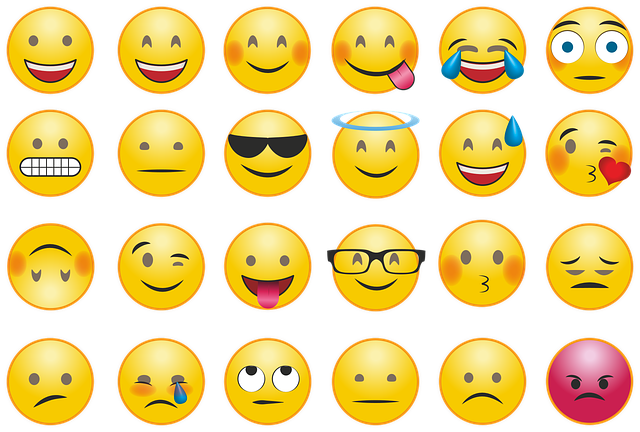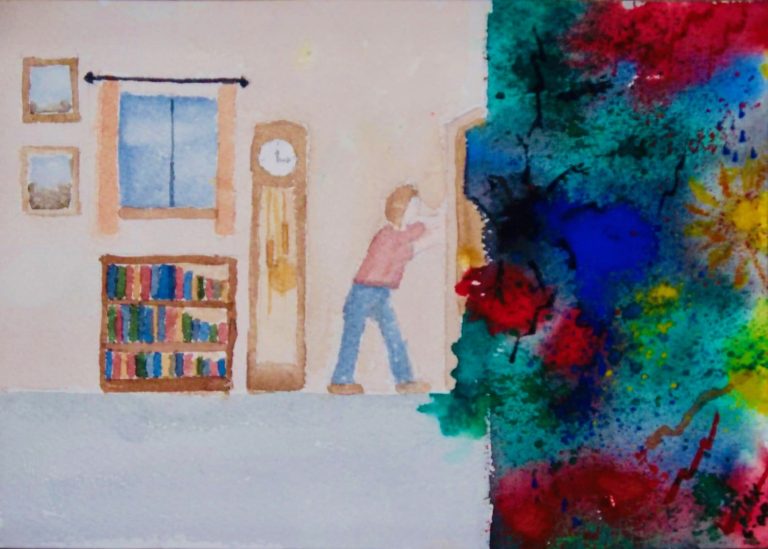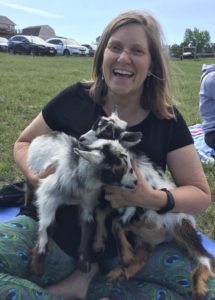Connecting with our Emotions

Connecting with our Emotions
Trigger warning! -Child abuse discussed, although sensitively and not in great detail. If you think this may be a difficult article for you to read, you may want to read it during an appointment with your therapist. If you choose to read it alone, do it at a time you are feeling less vulnerable and create a soothing environment- snuggly blankets or pillows, a warm drink, perhaps soft music or a relaxing diffused essential oil.
Denial warning!- I share my personal experiences because many of us with FND have a history of trauma. I want to be open and honest about mine to help others understand how our pasts can lead to disability. Not everyone with FND has a history of trauma. If you don’t, I’m truly happy for you. However, I would caution you not to allow that fact to dismiss the possibility of an FND diagnosis. It can happen to anyone.
Recent research shows that many of us with Functional Neurological Disorder have difficulties processing emotion. (Source) That part of our brains just isn’t working very well. Alexithymia is the medical term for this inability to easily access our emotions. One theory of FND is that our trapped emotion is released by our bodies in a physical way.
I was raised to be stoic. When my grandmother died when I was in my thirties, I remember sitting at her funeral with my mother, both of us with dry eyes, no hint of emotion on our faces and thinking how strong we both were. Actually, I’m pretty sure we both looked like cold-hearted bitches. My mom succeeded in her goal of making me a person who didn’t cry.
When I was a child, my mother couldn’t stand crying. I can remember her screaming, “Stop that crying! Stop it! Stop crying! I can’t stand it when you cry!” as she hit me over and over, punishing me for having normal emotion. Really, Mom? Hitting me just made me cry more. For a woman who ended up with a PhD, sometimes my mother was incredibly stupid. Eventually her methods worked. I learned to wall off my messy emotion in order to protect myself from my mom’s wrath.
As children, we just want to be loved. We want nothing more than to please our parents, to have them look at us with pride and joy. When I spilled my drink at dinner, I cried because I had failed. I had made my mom angry and I really didn’t want to do that. I tried to be careful, but I was a child. My mother would mop up the mess on the floor on her hands and knees, yelling at me to stop crying. “Why are you crying? I’m the one who has to clean it up. I’m the one who should be crying. Shut up!”. Watching her helplessly, I continued sobbing, brokenhearted that once again I had let down the most important person in my world.
Parents are the computer programmers for tiny brains. Some people get lucky and have a Bill Gates or Steve Jobs for their programmer. Others like me were not so lucky. A therapist once told me that I lost the parent lottery both times. I think of my parents as the equivalent of computer hackers, programming my innocent brain in a destructive way instead of equipping it to face the challenges of my future.
I don’t believe that they entered parenthood intending to be cruel. They had their own defective programming. My parents were badly damaged people. I personally don’t subscribe to the platitude “they did the best that they could”. Some of the unspeakable things done under the roof of a home that should have protected and nurtured my sisters and me cannot in any way be described as someone’s best. At times my parents’ actions only served their own warped and perverse desires, with no thought as to how they were irreparably damaging the precious children they had been given. I don’t allow any excuses for the evil that took place when I was growing up.
My greatest success in life and the accomplishment for which I am most proud is bringing three children into the world and raising them well. I was far from a perfect parent and I made my share of mistakes, but I consciously worked my butt off to be a decent mother. I carefully observed and asked questions to friends whose parenting skills I admired. My parenting library was full of books that helped me navigate the difficult job I had taken on. My husband and I spent hours behind closed doors discussing how best to handle situations we faced when our kids were growing up. He affirmed my fumbling attempts to “get it right”. He would tell me that I was doing a great job, that I broke the mold of the legacy of abuse. Thanks to him and a lot of hard work, we did a good job. Our children are wonderful, stable, loving, compassionate adults. They are the best gift that I could have given to the world.
My granddaughter is a toddler. I marvel at sippy cup design. Whoever the geniuses are who figured out how to prevent and minimize spills have certainly done their part to help prevent child abuse. Sometimes, my sweet granddaughter will hurl her cup to the floor just to delight in her ability to force liquid from her “spillproof” cup. I silently watch my daughter pick up the cup, put it out of reach, and patiently wipe up the spill. “I guess you’re not thirsty,” she says, as she picks up her precious baby, hugs her and gives her a kiss. My daughter understands that providing a safe, loving place to explore the world is the best way to program a tiny brain. What a contrast to the poor parenting skills of her ancestors! I am so proud of her!
I’ve always had the philosophy that we can learn something from everyone. Some people, like the friends I chose to teach me how to be a good parent, teach us how to be the kind of people we want to be. Others, like my parents, teach us how not to be. I knew as a child that my parents’ behavior was wrong and I vowed not to repeat it.
So what do we do with a poorly programmed brain? There was a time when we thought we couldn’t change the brains we had, but now thankfully we know that isn’t true. I still struggle with emotion, but I am working on allowing it in. I feel bad for my poor husband. He hates it when something he does or says makes me cry, but I remind him that it’s a good thing that I can cry in front of him. Most of the time my tears are locked inside. I feel safe with him, safe enough to trust him with my tears. As uncomfortable as sadness and emotional pain are, they are just feelings. They won’t destroy me.They are part of what makes me human. When I let myself feel sadness, I also allow for the possibility of joy.
One of the things I do that lets me access my emotions is paint- my self-prescribed art therapy. When I paint my emotional paintings, I’m not focused on technique, but on exploring and experiencing the feelings that arise. Some of my paintings are downright terrifying- angry and violent stabbings of red and black on my paper, visions of monsters hovering over a small girl, actual slashes on the paper with a razor blade. The time it takes to produce a painting allows the emotion to finally work its way to the surface and in the end, the catharsis is a sweet relief. I’ll keep most of the renderings of my psychopathology to myself. As much as I want to be vulnerable and authentic in this blog, I’d rather not be responsible for anyone’s nightmares. I will share this painting about emotion though. In it, I’m keeping my nice, ordered, structured life neat and tidy, shoving those messy emotions behind the door. It doesn’t work very well; see it spilling out? And see the bright spots of color trapped in the back? Blocking out the grief and pain also shuts out happiness.

If you struggle with feeling your emotions, maybe give painting a try. No one has to see it but you. Don’t worry about what it looks like, just think about how it feels. One of my friends just paints the colors that she feels. No need to paint something realistic if you don’t want to. Let the emotion pour from your paintbrush and notice how good it feels to let it go.
A few weeks ago I went to goat yoga. A friend raises goats and in the spring when the baby goats arrive, she invites a yoga instructor to lead classes in a field of baby goats. What a hilarious experience! Baby goats nibbled at my mat and my clothes, climbing over me as I occasionally attempted a yoga pose. My yoga mat was christened by baby goat pee. Animals and young children are great at helping us let down the barriers to our closely guarded emotion.
After goat yoga class, I went home and looked at the pictures my friend took. I was delighted to notice something on my face that I don’t see very often- JOY!!! It’s in there! Slowly I’m recovering my ability to feel.

Open yourself up to new experiences. Do something fun! Allow yourself to fully feel whatever arises. If your emotions are locked away, releasing them is a powerful step towards healing your wounded soul. It’s a daunting task, but it can be done and it’s worth the effort.
Namaste!

“When I let myself feel sadness, I also allow for the possibility of joy.” Your painting of holding shut the door so perfectly complements this!
I’d be at a loss to describe joy, but there is an element of openness, of something that flows through you without restraint. I think those of us used to blocking heart-mind channels for safety are often startled by how good it feels to open them (under the right circumstances).
Love the goat photos!!
Thanks for your comments, Jessica! I love how you identified joy as an element that flows without restraint. You are right; the guarding of our hearts, often learned to protect ourselves from further trauma, can restrict that flow. I appreciate your insights! Thanks for reading! 😊
I experienced a trauma before my FND.
😢 I’m sorry for your pain.